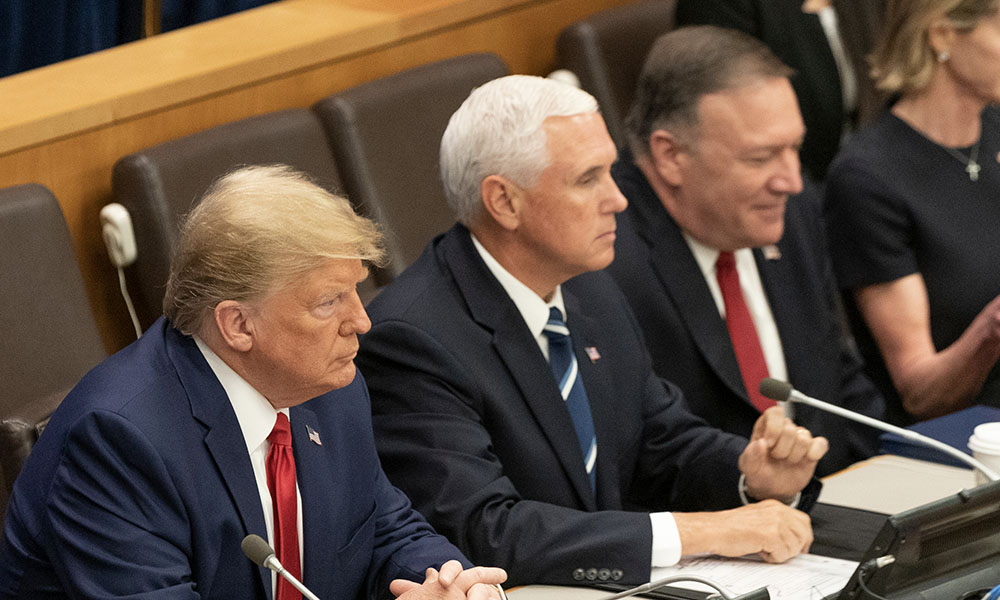The Trump Administration Wants Apple to Remove ‘Untrusted’ Chinese Apps from the App Store
 Credit: lev radin / Shutterstock
Credit: lev radin / Shutterstock
Toggle Dark Mode
China may no longer be the only regime putting pressure on Apple to remove unsanctioned content from the App Store, as the Trump administration prepares a list of “untrusted” Chinese apps that be banned from sale in the U.S.
Proposed as part of what it’s calling the “Clean Network” initiative, U.S. Secretary of State Mike Pompeo says the administration is focusing on five areas to prevent Chinese apps and companies from potentially accessing sensitive information on American citizens and businesses, according to Reuters.
The move, which is being referred to as “Clean Store,” follows on the heels of U.S. President Donald Trump’s more specific targeting of the social video-sharing app TikTok, and appears to be an expansion into what Pompeo says are apps that present “significant threats” to American citizens as well as “proliferating viruses” and being tools used by the Chinese government to “spread propaganda and disinformation.”
With parent companies based in China, apps like TikTok, WeChat and others are significant threats to personal data of American citizens, not to mention tools for CCP (Chinese Communist Party) content censorship.
U.S. Secretary of State Mike Pompeo
While the list of apps that would be included in the ban isn’t entirely clear as of yet, Pompeo did of course single out TikTok again, as well as mentioning the messaging app WeChat as another one of the “significant threats.”
The ban of Chinese apps is only one of the aspects of the escalating information security war being waged with China by the Trump administration. Pompeo added that under the “Clean Apps” section it is also working to prevent Chinese telecoms like Huawei from allowing popular U.S. apps to be installed on its phones, stating that it doesn’t want U.S. companies “to be complicit in Huawei’s human rights abuses, or the CCP’s surveillance apparatus.”
While Pompeo didn’t mention any specific companies, this would presumably include banning such high-profile apps as Facebook and Twitter from being used on Huawei phones, although it’s not entirely clear how the administration proposes to actually enforce this.
According to CNET, the three other aspects of the initiative, Clean Cloud, Clean Carrier, and Clean Cable, will also work to prevent American data from being stored on any cloud systems owned by Chinese companies, prevent Chinese carriers from connecting to U.S. cellular networks at all (meaning no roaming for customers between the U.S. and China), and ensuring the undersea internet cables aren’t being “subverted for intelligence gathering by the PRC at hyper scale.”
China’s Response
Such moves aren’t likely to help the situation in China, where relations with U.S. companies are already tense. In fact, many have predicted that as the Trump administration continues its crackdown on prominent Chinese companies like Huawei and TikTok, Apple could actually bear the brunt of retaliation by the Chinese government.
Chinese state-backed newspapers have already gone on record as referring to the Trump administration’s plans to back the sale of TikTok’s global operations to Microsoft as “open robbery” and a “smash and grab” that could lead to “mortal combat in the tech realm,” and following this latest announcement, China’s foreign minister, Wang Yi, has responded more directly stating that the U.S. “has no right” to take these actions, which he refers to as “a textbook case of bullying.”
Anyone can see through clearly that the intention of the U.S. is to protect it’s monopoly position in technology and to rob other countries of their proper right to development.
Chinese foreign minister Wang Yi
What About Apple?
Apple has always made it explicitly clear that it runs the App Store in full compliance with the local laws of each country in which it operates, and in fact this has been the exact reasoning behind the frequent — and often controversial — removal of apps from the Chinese App Store in the past. Just this past weekend Apple removed almost 30,000 games from the Chinese App Store that hadn’t been officially licensed for sale by the Chinese government.
So it’s unlikely that Apple will offer much resistance if the U.S. government orders the removal of Chinese apps from the U.S. App Store — provided the Trump administration creates this list in such a way that actually results in the apps being banned from sale under U.S. laws, as opposed to simply creating a semi-official “blacklist” of apps that it merely doesn’t like.
What will be more interesting to see is how the Chinese government may respond to Apple’s complicity in the removal of these apps. Arguably, it’s simply the other side of what China has been asking Apple to do for years, so it would be hypocritical for China to take issue with it, but Apple also makes for one of the most tempting targets if the Chinese government is looking for a U.S. tech company to make an example of within its own borders, and even if Chinese authorities don’t formally sanction Apple in any way, it wouldn’t be the first time that the tide of Chinese public opinion turned against Apple as a result of actions by the U.S. government.






